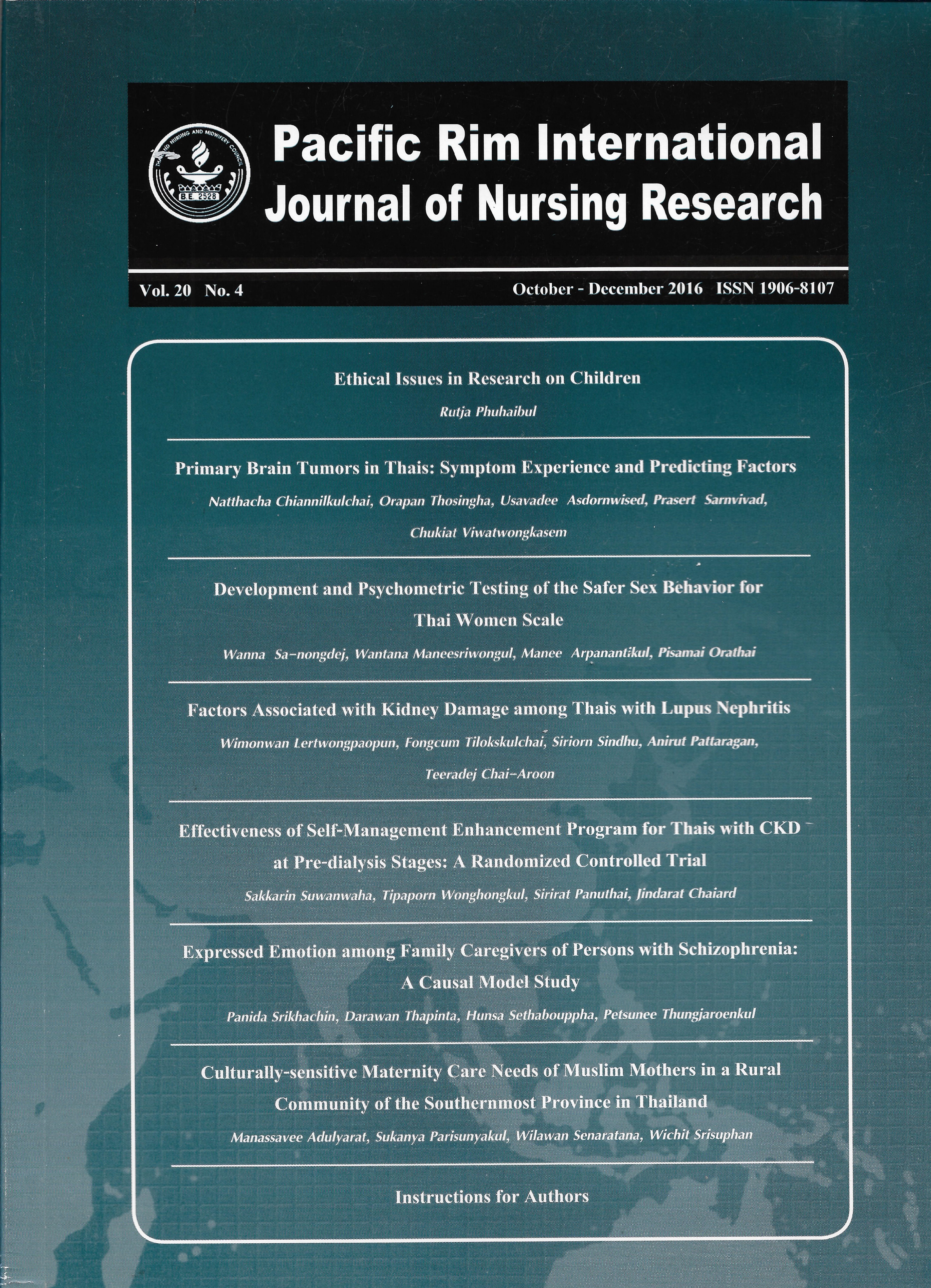Factors Associated with Kidney Damage among Thais with Lupus Nephritis
Keywords:
Disease Activity, Kidney Damage, Lupus Nephritis, Self-Management, ThailandAbstract
Kidney damage is a serious, irreversible, adverse change to the kidney, including anatomical, physiological, or functional damage. Thus, screening for and management of factors associated with kidney damage are necessary to initiate early intervention to prevent or minimize permanent damage to the kidneys. This descriptive cross-sectional study investigated the factors associated with kidney damage among Thais with lupus nephritis. Data collection took place between July 2012 and June 2013 at the auto- immunology, allergy, and rheumatology clinic of a large university hospital located in Bangkok, Thailand. The participants consisted of 140 persons with lupus nephritis. Data were obtained through a Personal Data Form, the Disease Activity Record, the Thai Depression Inventory, the Self-Management Questionnaire, and a Clinical Data Form and were analyzed by descriptive statistics; t-test and Cohen’s d effect size and chi-square. Findings indicated that disease duration, depression, disease activity, and self-management are associated with kidney damage among Thais with lupus nephritis, significantly. Cohen’s d effect size indicated that disease activity had the largest effect, followed by self-management, depression and disease duration, respectively. In terms of self-management, Cohen’s d indicated that nutrition had the largest effect, then avoiding risk factors such as fatigue, sun, stress, and infection. Disease activity and depression could be diminished by good self-management. Thus, nurses should provide self-management support emphasising a balanced diet, and minimizing exposure to risk factors, which will delay kidney damage.
References
2. Maroz N, Segal MS. Lupus Nephritis and End-stage Kidney Disease. Am J Med Sci 2013;346(4):319-23
3. Danila MI, Pons-Estel GJ, Zhang J, Vilá LM, Reveille JD, Alarcón GS. Renal damage is the most important predictor of mortality within the damage index: data from LUMINA LXIV, a multiethnic US cohort. Rheumatology (Oxford) 2009;48(5):542-5.
4. Bagavanta H., Fua SM. Pathogenesis of kidney disease in systemic lupus erythematosus. Curr Opin Rheumatol 2009, 21(5): 489–494.
5. Petri M, Purvey S, Fang H, Magder LS. Predictors of organ damage in systemic lupus erythematosus: the Hopkins Lupus Cohort. Arthritis Rheum 2012;64(12):4021-8.
6. Fiehn C. Early diagnosis and treatment in lupus nephritis: how we can influence the risk for terminal renal failure. J Rheumatol 2006;33(8):1464-6.
7. Guzmán J1, Cardiel MH, Arce-Salinas A, SánchezGuerrero J, Alarcón-Segovia D. Measurement of disease activity in systemic lupus erythematosus. Prospective validation of 3 clinical indices. J Rheumatol 1992;19(10): 1551-8.
8. Finnegan-John J, Thomas, VJ. The psychosocial experience of patients with end-stage renal disease and its impact on quality of life: findings from a needs assessment to shape a service. ISRN Nephrol 2013;2013:308986.
9. Marcus M, Yasamy MT, Om M. Depression: A Global Public Health Concern. [cited 2016 April 24] Available from: https://www.who.int/mental_health/management/ depression/who_paper_depression_wfmh_2012.pdf
10. American Psychiatric Association. Diagnostic and Statistical Manual of Mental Disorders, Fifth Edition. Washington, DC: American Psychiatric Association; 2013
11. Parrondo RR. Integral Treatment of Systemic Lupus Erythematosus. [cited 2016 April 24] Available from: https://cdn.intechopen.com/pdfs-wm/25475.pdf
12. Mak A, Ho RCM, Lau CS. Clinical implications of neuropsychiatric systemic lupus erythematosus. Advances in Psychiatric Treatment 2009;15(6):451–458
13. De Silva D. Evidence: helping people help themselves. A review of the evidence considering whether it is worthwhile to support self-management. London: The Health Foundation; 2011.
14. Boger E, Ellis J, Latter S, Foster C, Kennedy A, Jones F, et al. Self-Management and Self-Management Support Outcomes: A Systematic Review and Mixed Research Synthesis of Stakeholder Views. PLoS ONE [serial online] 2015;10(7) Retrieved April 8, 2016 from URL: https:// www.ncbi.nlm.nih.gov/pmc/articles/PMC4498685/ pdf/pone.0130990.pdf
15. Welch JL, Johnson M, Zimmerman L, Russell CL, Perkins SM, Decker BS. Self-management interventions in stages 1 to 4 chronic kidney disease: an integrative review. West J Nurs Res 2015;37(5):652-78.
16. Chen SH, Tsai YF, Sun CY, Wu IW, Lee CC, Wu MS. The impact of self-management support on the progression of chronic kidney disease—a prospective randomized controlled trial. Nephrol Dial Transplant 2011;26(11): 3560-6.
17. Yamane T. Statistics: An Introductory Analysis. Third edition. New York: Harper and Row Publication; 1973.
18. Osio-Salido E, Manapat-Reyes H. Epidemiology of systemic lupus erythematosus in Asia. Lupus 2010;19 (12):1365-73.
19. Bihl GR, Petri M, Fine DM. Kidney biopsy in lupus nephritis: look before you leap. Nephrol Dial Transplant 2006,21(7):1749–52.
20. Lotrakul M, Sukanich P. Development of the Thai Depression Inventory. J Med Assoc Thai 1999;82(12): 1200-7
21. Tantisak B. The Relationship between Selected Factors, Self-Care Behavior and Quality of Life in SLE Patients [thesis]. Bangkok: Mahidol University.; 1992.
22. Urairat P, Puwarawuttipanit W, Sriyuktasuth A, Teerapornlertratt T. Factors Influencing Relapse Prevention Behaviors in Lupus Nephritis Patients. J Nurs Sci 2012;30(3): 55-63.
23. Weening JJ, D’Agati VD, Schwartz MM, Seshan SV, Alpers CE, Appel GB, et al. The classification of glomerulonephritis in systemic lupus erythematosus revisited. J Am Soc Nephrol 2004;15(2):241–50.
24. Chambers SA, Allen E, Rahman A, Isenberg D. Damage and mortality in a group of British patients with systemic lupus erythematosus followed up for over 10 years. Rheumatology (Oxford) 2009;48(6):673-5.
25. Urowitz MB, Gladman DD, Ibanez D, Fortin PR, Bae SC, Gordon C, et al. Evolution of Disease Burden Over Five Years in a Multicenter Inception Systemic Lupus Erythematosus Cohort. Arthritis Care Res 2012;64(1):132-7.
26. Amissah-Arthur MB, Gordon C. Contemporary treatment of systemic lupus erythematosus: an update for clinicians. Ther Adv Chronic Dis 2010;1(4):163–175.
27. Parikh SV, Nagaraja HN, Hebert L, Rovin BH. Renal flare as a predictor of incident and progressive CKD in patients with lupus nephritis. Clin J Am Soc Nephrol. 2014;9:279–84.
28. Beckerman NL, Auerbach C, & Blanco I. Psychosocial dimensions of SLE: implications for the health care team. J Multidiscip Healthc. 2011;4: 63–72.
29. Urowitz MB, Gladman DD, Tom BD, Ibanez D, Farewell VT. Changing patterns in mortality and disease outcomes for patients with systemic lupus erythematosus. J Rheumatol 2008;35(11):2152-8.
Downloads
Published
How to Cite
Issue
Section
License
Copyright: The Pacific Rim International Journal of Nursing Research, Thailand Nursing & Midwifery Council has exclusive rights to publish, reproduce and distribute the manuscript and all contents therein.








.png)



